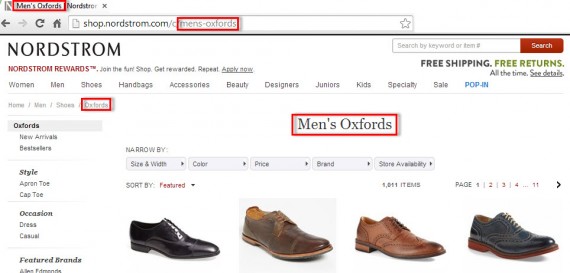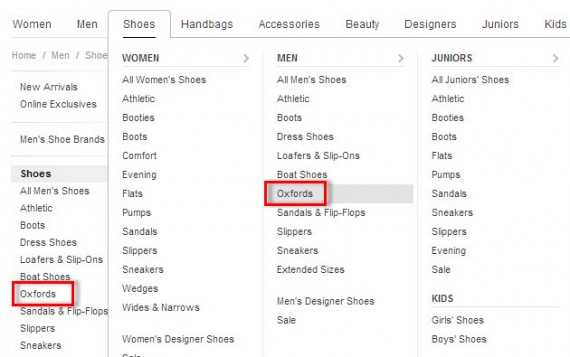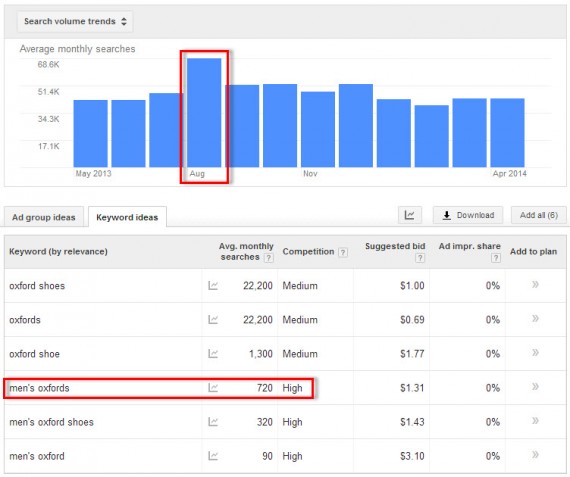Something as simple as the name of a page has an incredible impact on the optimization of that page in organic search. Platforms use page name data in so many aspects of the site that it becomes either a boost or a burden for your site’s search engine optimization.
How Page Titles Impact SEO
Your site is built on an ecommerce platform, like Magneto, OpenCart, Demandware, and many others. The platform contains an interface to enter content or data, from which the platform generates web pages for your ecommerce site.
One of the foundational pieces of content that the platform uses repeatedly in every page is the name of that page. Some platforms call it the page title or the headline; but whatever it’s called the page name serves several very important purposes.
The page name acts as a way to identify and locate that page in the system when you’re making modifications or tracking performance. More importantly for SEO, the page name is used in all of the elements circled in the page shown below.

The elements on Nordstrom’s Men’s Oxfords page that feature the page name.
The page name “Oxfords” is displayed in the breadcrumb. It’s also paired with the category name “Men’s” to form “Men’s Oxfords” in the title tag (seen in the browser tab), the URL, and the H1 heading. All of these textual elements combine to strengthen this page’s keyword relevance for “Men’s Oxfords.”
In addition, the page name “Oxfords” appears in the site’s global header navigation, found on every page of the site, and in the category-based left navigation for Men’s Shoes, as shown below.

The elements in Nordstrom’s Men’s Shoes navigation that feature the page name.
The navigational link anchor text sends keyword relevance signals to the page it links to, but it also passes some of the linking page’s authority. For example, the Men’s Shoes page links to the Oxfords page. In doing so, the Men’s Shoes page passes a little of its link authority to the Oxfords page, and passes a keyword relevance signal to the Oxfords page for the word “Oxfords.”
The fact that the platform uses that page name in so many places in each page means that the page is naturally optimized for its page name.
SEO Keywords in Page Names
When the page name contains keywords that are beneficial to SEO, the page will naturally be optimized for the words that real customers search for because those words will automatically be used in so many of the elements on the page that are important to SEO.
Keyword research is the first step toward choosing optimal page names – those that match up with the words real people use when they’re searching and shopping. For an in depth tutorial on keyword research, see “Optimizing a Page for Search Engines, Part 1: Keyword Research.”
Google’s AdWords Keyword Planner gives you free access to the data you need to make page name decisions. Returning to the men’s oxfords example from above, there may be other keywords that you could target that are more valuable than “men’s oxfords.”
In this example, Nordstrom is indeed targeting the most valuable phrase already. The keyword research example below shows that “men’s oxfords” is searched for in Google an average of 720 times a month, over twice as many times as the next largest search volume: “men’s oxford shoes.”

Keyword research related to men’s oxford shoes.
The very large search volume for “oxford shoes” at 22,200 average Google searches per month is very tempting, but should ideally be targeted on a page that contains all oxford shoes for all genders and ages rather than just men’s or women’s.
Alternately, if your ecommerce site sells only men’s shoes, you could definitely target “oxford shoes” without the “men’s” modifier and shoot for that larger bucket of searches. Do it quickly, though. August is the peak month for oxford searches.
When Page Names Aren’t Optimal for SEO
If the page name does not contain keywords that are beneficial to SEO, content optimization becomes more difficult. In all likelihood, as you try to optimize the elements that the platform controls, you’ll probably face the following choices.
- Changing the page name. This seems like the easiest option. But remember, if you change the page name so that the platform will automatically insert the keywords into the elements that matter for SEO, the URL for that page may change as well depending on the platform you use. Modifying URLs in itself is a disrupter for SEO, and will affect a variety of other areas as well. It can disrupt other marketing channels that depend on URLs, such as paid search and email marketing. It may also cause a split in your analytics that makes it difficult to compare page-based metrics to determine performance.
- Options for your platform. Most platforms have SEO plugins, add-ons or advanced options tucked away in the depths of their interface that enable you to edit your SEO elements separately from the page name. This is the solution least likely to disrupt other channels while improving your SEO.
- Modifying the platform. Some ecommerce businesses with talented in house developers choose to modify the platform themselves to meet their needs.
- Changing platforms. This is the last option most ecommerce sites would take because the platform is so tied in to the way you do business. However, if you’re already shopping for a platform and a redesign is eminent, you may consider adding SEO to the list of reasons to switch.
Managing your SEO strategy within the framework of your larger ecommerce business is always a compromise. SEO professionals should propose the ideal solution for SEO and work with the rest of the team to revise that ideal to fit the reality of the platform, marketing goals, business needs, brand voice and countless other variables.
If SEO is a top priority for your business, and if keyword research shows that your page names aren’t optimal to drive organic search performance, this could be a good way to optimize your site more scalably at the point where content optimization meets the platform.





